In addition to the general issues of personal safety in large cities such as Boston and Cambridge, research and education in science and engineering may involve a variety of chemical, biological, radiation and safety hazards in laboratories and shops. Both MIT and the Department of Biological Engineering place a high priority on personal security and on the health and safety of students and all employees in the work environment, as well as a special respect for the impact of MIT activities on the environment.
Environmental Health and Safety (EHS)
Environmental health and safety at MIT is a two-way street, with strong emphasis placed on the health and safety of all members of the MIT community as well as on the impact of MIT research and teaching activities on the local and global environment. As such, MIT has implemented an Environmental Health and Safety (EHS) program designed to provide all of the necessary training for safe use of chemical, radiation and biological hazards as well as for general safety in the laboratory and shop settings. Each department and center has an EHS Coordinator who works with a member of the central MIT EHS Office that coordinates safety training and inspections of all MIT laboratories and living spaces.
Training begins during orientation week each August/September for new students in the Department of Biological Engineering with a mandatory safety presentation by the Department EHS Coordinator (Mary Lindstrom). This is a general training session designed to provide a broad overview of the EHS system in the Department and throughout MIT. Subsequent training must take place before any student will be allowed to undertake research in any laboratory at MIT, including teaching laboratories. Once a student joins a faculty laboratory, there is a requirement for additional training in areas appropriate for each individual laboratory, including radiation safety training, biohazards training and specialized training in the management and disposal of toxic chemicals. This training is reinforced with annual recertification training. Finally, each laboratory will have unique hazards with which students are obliged to become familiar; the EHS Officer for each laboratory and Center coordinates this training. The point of all of this training is preservation of your health and safety as well as that of your fellow students and laboratory mates and the health of the environment.
EHS Contact Information:
- During Business Hours: 2-EHSS (617-452-3477); the appropriate EHS program specialist will respond to your call in a few minutes.
- During Weekends And After Hours: Contact the Department of Facilities Operations Center at 3-4948 (617- 253-4948) and an EHS Team member will be paged.
- Life-Threatening Situation: also dial 100 for Campus Emergency
Safe Ride
The Parking and Transportation Office operates MIT’s safety shuttle van known as SafeRide. SafeRide provides a safe means of transportation at night within and around the MIT campus.
Safe Ride operates 7 days a week from:
- 6:00 P.M. to 3:00 A.M. Sunday through Wednesday
- 6:00 P.M. to 4:00 A.M. Thursday through Saturday
This service is free and available to all members of the MIT community. The Saferide vans are driven by service assistant employees of Standard Parking, who carry two-way radios for a direct link to the SafeRide Office and the Campus Police. In addition, the Campus Police will accommodate requests for after hour safety rides until daylight.
- Safe Ride Contact Information:
- The SafeRide Office
- (617) 253-2997
- mitparking@mit.edu
Emergency Numbers
The following emergency numbers can be dialed from campus telephones:
- MIT Medical (24-hour urgent care)
- From a campus phone: 3-1311
- From a cell phone, pay phone, or off-campus: 617-253-1311
- Emergency closings (recorded updates) 617-253-SNOW (617-253-7669)
- International SOS (emergency medical and security evacuation services for those traveling abroad on MIT business) (requires certificates) 617-253-2823
- MIT Campus Emergencies (24-hour police, ambulance, fire, first aid, dean on call)
- To report an emergency:
- From a campus phone: 100
- From a cell phone, pay phone, or off-campus: 617-253-1212
- Emergency Information line (for status of emergencies): 617-253-SNOW (7669)
- Facilities (24-hour emergency repairs)
- From a campus phone: 3-4948
- From a cell phone, pay phone, or off-campus: 617-253-4948
- Saferide (campus transportation: 6:00pm – 3:00am)
- Saferide (campus transportation: 6:00pm – 3:00am)
- From a campus phone: 3-2997
- From a cell phone, pay phone, or off-campus: 617-253-299
- MIT News Office
- From a campus phone: 3-2700
- From a cell phone, pay phone, or off-campus: 617-253-2700
- Information Center
- From a campus phone: 3-4795
- From a cell phone, pay phone, or off-campus: 617-253-4795
- MIT Police
- General business: 617-253-1212
- Guest parking: 617-253-7276
- Lost and found: 617-253-9753
- Computer and Communications Outages 3-DOWN: 617-253-3696
- Environment, Health & Safety Office
- From a campus phone: 2-3477
- From a cell phone, pay phone, or off-campus: 617-452-3477
- Security and Emergency Management Office
- From a campus phone: 8-7366
- From a cell phone, pay phone, or off-campus: 617-258-7366
- Telephone service
- MIT directory assistance: 0 or 617-253-1000
- Service problems: 617-253-4357
